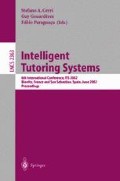Abstract
In this paper, we present the architecture and describe the functionality of a Web-based Intelligent Tutoring System (ITS), which uses neurules for knowledge representation. Neurules are a type of hybrid rules integrating symbolic rules with neurocomputing. The use of neurules as the knowledge representation basis of the ITS results in a number of advantages. Part of the functionality of the ITS is controlled by a neurule-based inference engine. Apart from that, the system consists of four other components: the domain knowledge, containing the structure of the domain and the educational content, the user modeling component, which records information concerning the user, the pedagogical model, which encompasses knowledge regarding the various pedagogical decisions, and the supervisor unit that controls the functionality of the whole system. The system focuses on teaching Internet technologies.
Access this chapter
Tax calculation will be finalised at checkout
Purchases are for personal use only
Preview
Unable to display preview. Download preview PDF.
References
Angelides, M., Garcia, I.: Towards an Intelligent Knowledge Based Tutoring System for Foreign Language Learning. Journal of Computing and Information Technology 1 (1993) 15–28.
Brusilovsky, P., Kobsa, A., Vassileva, J. (Eds.): Adaptive Hypertext and Hypermedia. Kluwer Academic Publishers, Dordrecht, Netherlands (1998).
Georgouli, K.: Modelling a Versatile Mathematical Curriculum for Low-attainers. Proceedings of the 8th Panhellenic Conference in Informatics (2001) 463–472.
Hatzilygeroudis, I., Prentzas, J.: Neurules: Improving the Performance of Symbolic Rules. International Journal on Artificial Intelligence Tools 9 (2000) 113–130.
Hatzilygeroudis, I., Prentzas, J.: Constructing Modular Hybrid Knowledge Bases for Expert Systems. International Journal on Artificial Intelligence Tools 10 (2001) 87–105.
Hatzilygeroudis, I., Prentzas, J.: An Efficient Hybrid Rule Based Inference Engine with Explanation Capability. Proceedings of the 14th International FLAIRS Conference. AAAI Press (2001)227–231.
Magoulas, G.D., Papanikolaou, K.A., Grigoriadou, M.: Neuro-fuzzy Synergism for Planning the Content in a Web-based Course. Informatica 25 (2001) 39–48.
Martin, J., VanLehn, K.: Student assessment using Bayesian nets. International Journal of Human-Computer Studies 42 (1995) 575–591.
Nkambou, R.: Using Fuzzy Logic in ITS-Course Generation. Proceedings of the 9th IEEE International Conference on Tools With Artificial Intelligence. IEEE Computer Society Press (1997) 190–194.
Shiri, M. E., Aimeur, E., Frassen, C.: Student Modelling by Case-Based Reasoning. In Goettl, B.P., Halff, H.M., Redfield, C.L., Shute, V.J. (eds.): Fourth International Conference on Intelligent Tutoring Systems. Lecture Notes in Computer Science, Vol. 1452. Springer-Verlag, Berlin (1998) 394–404.
Solomos, K., Avouris, N.: Learning from Multiple Collaborating Intelligent Tutors: An Agent-Based Approach. Journal of Interactive Learning Research 10 (1999) 243–262.
Stern, M., Woolf, B.: Curriculum Sequencing in a Web-based Tutor. In: Goettl, B.P., Halff, H.M., Redfield, C.L., Shute, V.J. (eds.): Fourth International Conference on Intelligent Tutoring Systems. Lecture Notes in Computer Science, Vol. 1452. Springer-Verlag, Berlin (1998) 574–583.
Vassileva, J.: Dynamic Courseware Generation. Journal of Computing and Information Technology 5 (1997) 87–102.
Author information
Authors and Affiliations
Editor information
Editors and Affiliations
Rights and permissions
Copyright information
© 2002 Springer-Verlag Berlin Heidelberg
About this paper
Cite this paper
Prentzas, J., Hatzilygeroudis, I., Garofalakis, J. (2002). A Web-Based Intelligent Tutoring System Using Hybrid Rules as Its Representational Basis. In: Cerri, S.A., Gouardères, G., Paraguaçu, F. (eds) Intelligent Tutoring Systems. ITS 2002. Lecture Notes in Computer Science, vol 2363. Springer, Berlin, Heidelberg. https://doi.org/10.1007/3-540-47987-2_16
Download citation
DOI: https://doi.org/10.1007/3-540-47987-2_16
Published:
Publisher Name: Springer, Berlin, Heidelberg
Print ISBN: 978-3-540-43750-5
Online ISBN: 978-3-540-47987-1
eBook Packages: Springer Book Archive

